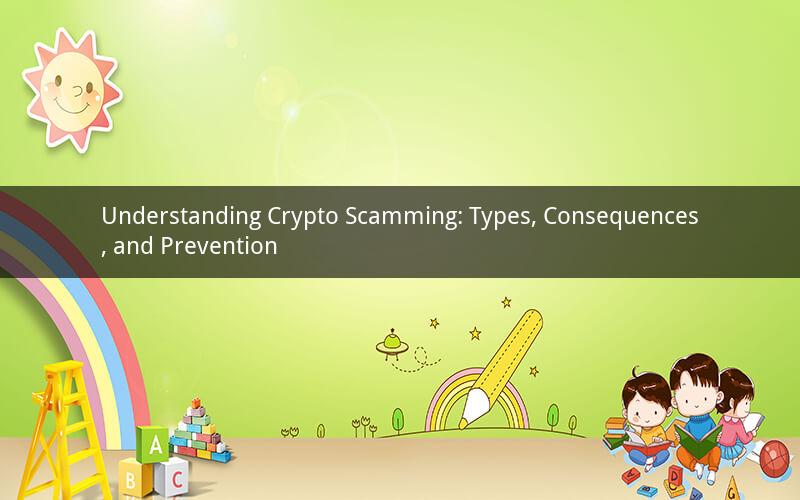
Crypto scamming has become an increasingly prevalent issue in the world of digital currencies. As cryptocurrencies gain popularity, so does the number of fraudulent activities targeting unsuspecting individuals. This article delves into the concept of crypto scamming, exploring its various types, consequences, and ways to prevent falling victim to such fraudulent schemes.
Types of Crypto Scamming
1. Phishing Attacks
Phishing attacks are one of the most common forms of crypto scamming. Scammers create fake websites or emails that mimic legitimate platforms, such as cryptocurrency exchanges or wallets, to steal sensitive information like private keys and login credentials. Unsuspecting victims are tricked into providing their personal details, which are then used to access their cryptocurrency accounts and drain their assets.
2. Ponzi Schemes
Ponzi schemes are fraudulent investment scams that promise high returns to investors in exchange for their investment. The scheme relies on the constant influx of new investors to pay off earlier investors, creating the illusion of a successful business. However, the scheme collapses when there are no new investors, leaving many individuals with significant financial losses.
3. Fake Exchanges
Fake exchanges are fraudulent platforms that mimic legitimate cryptocurrency exchanges. Scammers set up these exchanges to deceive individuals into depositing their cryptocurrencies, only to vanish with the funds. These exchanges often lack the necessary security measures, making them prime targets for scammers.
4. Ransomware
Ransomware is a type of malware that encrypts a victim's files, rendering them inaccessible. Scammers demand a ransom payment in cryptocurrencies to decrypt the files. This type of scam is particularly dangerous as it not only targets individuals but also businesses, potentially causing significant financial and operational damage.
5. Pump and Dump
Pump and dump schemes involve manipulating the price of a cryptocurrency by artificially inflating it through large-scale buying, followed by selling off the assets at a higher price. Scammers lure unsuspecting individuals to buy the cryptocurrency at an inflated price, only for the price to plummet, leaving them with substantial losses.
Consequences of Crypto Scamming
1. Financial Loss
The most immediate consequence of falling victim to crypto scamming is financial loss. Individuals may lose their entire investment, private keys, or both. In some cases, the loss may be irrecoverable, leaving the victim with a significant financial burden.
2. Emotional Trauma
The psychological impact of being scammed can be devastating. Victims may experience feelings of betrayal, frustration, and despair. The emotional trauma can be long-lasting, affecting their overall well-being.
3. Loss of Trust
Crypto scamming erodes trust in the cryptocurrency ecosystem. As more individuals fall victim to these fraudulent schemes, the perception of cryptocurrencies as a safe and secure investment option diminishes. This loss of trust can hinder the growth and adoption of digital currencies.
4. Legal and Regulatory Challenges
Crypto scamming poses significant legal and regulatory challenges. Law enforcement agencies struggle to track down scammers, as they often operate across borders and use sophisticated methods to hide their identities. Additionally, the lack of regulation in the cryptocurrency market makes it difficult to hold scammers accountable.
Ways to Prevent Crypto Scamming
1. Educate Yourself
Knowledge is the best defense against crypto scamming. Familiarize yourself with common scams and their red flags. Stay updated on the latest trends and techniques used by scammers to avoid falling victim to their fraudulent schemes.
2. Use Secure and Legitimate Platforms
Always use secure and reputable cryptocurrency exchanges, wallets, and other platforms. Conduct thorough research before choosing a platform, ensuring it has a strong track record of security and customer support.
3. Be Wary of Unbelievable Returns
If an investment opportunity seems too good to be true, it probably is. Avoid falling for Ponzi schemes and other fraudulent investments that promise exorbitant returns with minimal risk.
4. Keep Your Private Keys Safe
Never share your private keys or login credentials with anyone. Scammers often use these details to gain unauthorized access to your cryptocurrency accounts and steal your assets.
5. Use Two-Factor Authentication
Enable two-factor authentication (2FA) on all your cryptocurrency accounts. This adds an extra layer of security, making it more difficult for scammers to access your accounts.
Frequently Asked Questions
1. How can I tell if a cryptocurrency exchange is legitimate?
Answer: Look for reputable reviews, a strong track record of security, and transparent customer support. Be wary of exchanges that lack these qualities.
2. What should I do if I suspect I have fallen victim to a crypto scam?
Answer: Contact the platform immediately and report the scam. Save all relevant evidence, such as emails or messages, to assist law enforcement agencies in their investigation.
3. Can I recover my lost cryptocurrency?
Answer: The likelihood of recovering lost cryptocurrency depends on the type of scam and the actions you take. Consult with a legal professional to explore your options.
4. How can I protect my private keys from scammers?
Answer: Store your private keys in a secure and offline location, such as a hardware wallet or a paper wallet. Avoid sharing your private keys with anyone, even friends or family.
5. Are there any legal consequences for participating in a Ponzi scheme?
Answer: Yes, participating in a Ponzi scheme can lead to legal consequences, including fines and imprisonment. It is crucial to avoid engaging in any fraudulent activities related to cryptocurrencies.